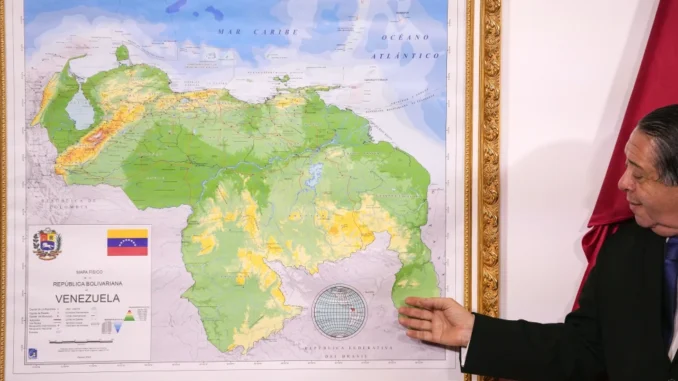
Guyana is poised to turn to the United Nations’ International Court of Justice (ICJ) as tensions with Venezuela intensify over the long-disputed Essequibo region. This move marks the latest chapter in a territorial conflict that has simmered for over a century, with both nations asserting sovereignty over the resource-rich area, which constitutes nearly two-thirds of Guyana’s territory.

The Essequibo dispute traces its roots back to colonial times. In 1899, an arbitration tribunal awarded the region to Guyana, then a British colony. However, Venezuela has consistently contested the ruling, claiming that the decision was invalid due to alleged collusion between Britain and the arbitrators. Following Guyana’s independence in 1966, Venezuela revived its claims, casting a shadow over bilateral relations and complicating Guyana’s efforts to fully develop the region.
The Essequibo territory is rich in natural resources, including gold, diamonds, and oil. Recent discoveries of significant offshore oil reserves near the disputed area have added urgency to the issue, with both nations seeking to bolster their economic prospects. ExxonMobil’s exploration success in Guyana’s waters has transformed the nation into one of the fastest-growing economies in the world, further fueling Venezuela’s resolve to assert its claim.
In recent weeks, the Venezuelan government has escalated its rhetoric and actions. A referendum held in Venezuela in December 2024 reaffirmed its claim to the Essequibo region, drawing sharp criticism from Guyana and the international community. Guyanese President Irfaan Ali has condemned Venezuela’s moves as a violation of international law and an infringement on Guyana’s sovereignty. Meanwhile, regional organizations such as CARICOM and the Organization of American States have expressed solidarity with Guyana, urging a peaceful resolution through legal and diplomatic means.
The ICJ’s involvement in the dispute began in 2018 when Guyana filed a case seeking a definitive ruling on the validity of the 1899 arbitration award. The court’s jurisdiction was confirmed in 2020, and hearings have since proceeded. Guyana’s decision to accelerate its engagement with the ICJ reflects its commitment to resolving the dispute within the framework of international law. The country’s legal team has emphasized the binding nature of the 1899 award and accused Venezuela of attempting to undermine decades of established boundaries.
For Venezuela, the dispute serves as a rallying point amid domestic challenges, including economic turmoil and political instability. The government of President Nicolás Maduro has used the Essequibo claim to galvanize nationalist sentiment, portraying its stance as a defense of Venezuela’s territorial integrity. However, critics argue that this approach risks isolating Venezuela diplomatically and exacerbating regional tensions.
The stakes are high for both nations. For Guyana, securing international recognition of its sovereignty over the Essequibo region is crucial for its territorial integrity and economic development. For Venezuela, the dispute is intertwined with broader questions of national identity and geopolitical influence.
As the ICJ prepares to deliberate on the case, the international community will closely watch the proceedings, recognizing that the outcome could set a precedent for resolving territorial disputes peacefully. For now, Guyana remains steadfast in its pursuit of justice through the world’s highest court, hoping to bring closure to a dispute that has defined its history and shaped its future.
Leave a Reply